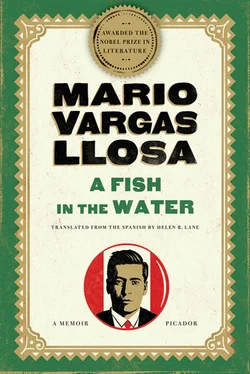Mario Vargas Llosa - A Fish in the Water - A Memoir
Здесь есть возможность читать онлайн «Mario Vargas Llosa - A Fish in the Water - A Memoir» весь текст электронной книги совершенно бесплатно (целиком полную версию без сокращений). В некоторых случаях можно слушать аудио, скачать через торрент в формате fb2 и присутствует краткое содержание. Год выпуска: 2015, Издательство: Macmillan, Жанр: Биографии и Мемуары, на английском языке. Описание произведения, (предисловие) а так же отзывы посетителей доступны на портале библиотеки ЛибКат.
- Название:A Fish in the Water: A Memoir
- Автор:
- Издательство:Macmillan
- Жанр:
- Год:2015
- ISBN:нет данных
- Рейтинг книги:3 / 5. Голосов: 1
-
Избранное:Добавить в избранное
- Отзывы:
-
Ваша оценка:
- 60
- 1
- 2
- 3
- 4
- 5
A Fish in the Water: A Memoir: краткое содержание, описание и аннотация
Предлагаем к чтению аннотацию, описание, краткое содержание или предисловие (зависит от того, что написал сам автор книги «A Fish in the Water: A Memoir»). Если вы не нашли необходимую информацию о книге — напишите в комментариях, мы постараемся отыскать её.
is a twofold book: a memoir of one of Latin America's most celebrated witers, beginning with his birth in 1936 in Arequipa, Peru; and the story of his organization of the reform movement which culminated in his bid for the Peruvian presidency in 1990.
A Fish in the Water: A Memoir — читать онлайн бесплатно полную книгу (весь текст) целиком
Ниже представлен текст книги, разбитый по страницам. Система сохранения места последней прочитанной страницы, позволяет с удобством читать онлайн бесплатно книгу «A Fish in the Water: A Memoir», без необходимости каждый раз заново искать на чём Вы остановились. Поставьте закладку, и сможете в любой момент перейти на страницу, на которой закончили чтение.
Интервал:
Закладка:
From Cochabamba I remember the Salta-style meat pies and the Sunday lunches, with the whole family present — Uncle Lucho was already married to Aunt Olga, no doubt, and Uncle Jorge to Aunt Gaby — and the enormous family dining table, where everyone always reminisced about Peru, or perhaps I should say about Arequipa, and where we all hoped that when it came time for dessert there would appear the sopaipillas , delicious fritters dipped in honey, and the guargüeros , pineapple and coconut sweets, desserts typical of Tacna and Moquegua, that Granny and Mamaé made with magic hands. I remember the Urioste and Beverley swimming pools to which Uncle Lucho took me, in which I learned to swim, the sport I liked best as a youngster and the only one in which I managed to acquire a certain skill. And I also remember, with the greatest affection, the little stories and the books that I read with mystical concentration and absorption, totally immersed in their world of illusion — the stories of Genevieve of Brabant and William Tell, of King Arthur and Cagliostro, of Robin Hood and the hunchback Lagardère, of Sandokán and Captain Nemo, and, above all, the series about Guillermo, a mischievous little boy my age, about whom each book in the series recounted an adventure which I tried to repeat afterward in the garden of the house. And I remember my first scribblings as a storyteller, which were usually in the form of little verses, or prolongations and amended versions of the stories I read, for which the family praised me. Grandfather was fond of poetry — my great-grandfather Belisario had been a poet and had had a novel published — and he taught me to memorize verses by Campoamor or Rubén Darío, and both he and my mother (who kept on her night table a copy of Pablo Neruda’s Veinte poemas de amor y una canción desesperada , Twenty Love Poems and a Song of Despair, which she forbade me to read) congratulated me on those preliterate ventures as charming signs of my poetic gifts.
Despite her being so young, my mother did not have — nor did she want — suitors. Shortly after arriving in Cochabamba she began to work as an assistant accountant in the branch office of the Grace Line and her work and her son occupied her entire life. The explanation was that she couldn’t even think of marrying again since she was already married in God’s eyes, the only kind of marriage that counted, something she doubtless believed wholeheartedly, since she is the most Catholic of Catholics in that firmly Catholic family that the Llosas were — and still are, I believe. But, even more deep-seated than the religious reason for her remaining indifferent to those suitors who flocked about her after her divorce, was the fact that, despite what had happened, she was still in love with my father, with a total and unyielding passion, which she hid from all those around her, until, when the family went back to Peru, the Ernesto J. Vargas who had disappeared appeared again, to enter her life and mine once more, like a whirlwind.
“My papa is here in Piura?”
It was like one of those storybook fantasies, so captivating and exciting that they seemed true, but only as long as the time it took to read them. Was this one too going to vanish all of a sudden, like the ones in books the minute I closed them?
“Yes, in the Hotel de Turistas.”
“And when am I going to see him?”
“Right now. But don’t tell Grandpa and Grandma. They don’t know he’s here.”
From a distance, even the bad memories of Cochabamba seem like good ones. There were two bad ones: my tonsillectomy and the Great Dane in the garage of a German, Señor Beckmann, located across the street from our house on Ladislao Cabrera. They tricked me into going to Dr. Sáenz Peña’s office, telling me that it was just another visit like the other ones I made for my frequent fevers and sore throats, and once we got there they sat me down in the lap of a male nurse who imprisoned me in his arms, as Dr. Sáenz Peña opened my mouth and sprayed a little ether in it, with a squirt gun that looked like the one that my uncles took with them to festivities in the streets at Carnival time. Afterward, as I was convalescing under the pampering care of Granny Carmen and Auntie Mamaé, I was allowed to eat lots of ice cream. (Apparently, during that operation under local anesthesia, I screamed and wriggled about, interfering with the removal of my tonsils by the surgeon, who botched the operation and failed to remove bits of them. They grew larger and larger and today they are again the same size as they were then.)
Señor Beckmann’s Great Dane fascinated and terrified me. He kept it tied up and its barking deafened me in my nightmares. At one time Jorge, the youngest of my uncles, kept his car in that garage and I would go there with him, secretly relishing the idea of what might happen if Señor Beckmann’s Great Dane got loose. One night it flung itself on us. We took off at a run. The animal chased us, caught up with us as we reached the street, and tore the seat of my trousers. The bite it gave me was superficial, but the excitement and the dramatic versions of it that I gave my schoolmates lasted for weeks.
And one day it happened that “Uncle José Luis,” the Peruvian ambassador to La Paz and a relative of my grandfather Pedro’s, was elected president of the Republic, in far-off Peru. The news electrified the whole family, in which Uncle José Luis was looked upon as a revered celebrity. He had come to Cochabamba and been at our house a number of times, and I shared the family’s admiration for this important relative who was so well-spoken, wore a bow tie, a hat with a ribbon-bound brim, and walked with his short legs spread wide apart, just like Charlie Chaplin — because on each of those visits to Cochabamba he had left a bit of spending money in my pocket when he said goodbye to me.
Once he had entered office, Uncle José Luis offered to appoint my grandfather to the post either of Peruvian consul in Arica or of prefect of Piura. My grandpa, whose ten-year contract with the Saids had just ended, chose Piura. He departed almost immediately, leaving the rest of the family with the task of clearing out our things from the house. We stayed there until almost the end of 1945, so that my cousins Nancy and Gladys and I could take our year-end exams. I have a vague idea of those last months in Bolivia, of the interminable succession of visitors who came to say goodbye to the Llosas, who in many ways were now a Cochabamba family: Uncle Lucho had married Aunt Olga, who, although Chilean by birth, was Bolivian by family background and heartfelt loyalties, and Uncle Jorge was married to Aunt Gaby, who was Bolivian on both sides of her family. Moreover, our family had grown in Cochabamba. Family legend has it that I tried to see the arrival in this world of the first daughter, Wanda, born to Uncle Lucho and Aunt Olga, by spying on her birth from one of the tall trees in the front patio, from which Uncle Lucho hauled me down by one of my ears. But that must not be true, since I don’t remember it, or if it’s true, I didn’t manage to find out very much, because, as I’ve already said, I left Bolivia convinced that children are ordered from heaven and brought into the world by storks. In any event, I was not able to spy on the appearance on this earth of the second daughter born to Uncle Lucho and Aunt Olga, my cousin Patricia, for she was born in the hospital — the family was resigning itself to modern ways — barely forty days before the return of the tribe to Peru.
I have a very vivid impression of the Cochabamba railway station, the morning we took the train. There were many people who had come to say goodbye to us and some of them were weeping. But I wasn’t, nor were my friends from La Salle who had come to give me one last farewell hug: Romero, Ballivián, Artero, Gumucio, and my closest friend of all, the son of the town photographer, Mario Zapata. We were grownups — nine or ten years old — and grownup men don’t cry. But Señora Carlota and other ladies, and the cook and the housemaids, were crying, and, holding fast to Granny Carmen, the gardener, Saturnino, an old Indian, wearing sandals and a cap with earflaps, was weeping too. I can still see him running alongside the train window and waving goodbye as the train pulled out of the station.
Читать дальшеИнтервал:
Закладка:
Похожие книги на «A Fish in the Water: A Memoir»
Представляем Вашему вниманию похожие книги на «A Fish in the Water: A Memoir» списком для выбора. Мы отобрали схожую по названию и смыслу литературу в надежде предоставить читателям больше вариантов отыскать новые, интересные, ещё непрочитанные произведения.
Обсуждение, отзывы о книге «A Fish in the Water: A Memoir» и просто собственные мнения читателей. Оставьте ваши комментарии, напишите, что Вы думаете о произведении, его смысле или главных героях. Укажите что конкретно понравилось, а что нет, и почему Вы так считаете.












